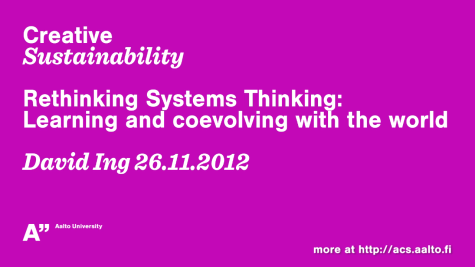When can learning about system thinking be fun (and when can’t it be)? This was the focus question for the third Systems Thinking Ontario meeting. We had a slight change in format from the reading-oriented prior agendas, as Steve Easterbrook led us through a more experiential approach to systems thinking. As usual, participants were provided with pre-readings, this time from Linda Booth Sweeney. As a change for the in-person meeting, Steve went directly to exercises from the Systems Thinking Playbook, which he has been using in classes such as Systems Thinking for Global Problems. While the exercises are appropriate for students down into the primary school level, Steve has found that graduate students also enjoy and learn from them. In the short time available, we played through two exercises and then broke out into discussion subgroups.
The first exercise was called “Frames”. Steve provided each of us with a piece of paper with a small aperture cut out of the centre.
The playbook gives the following directions.
… Read more (in a new tab)Geographic Framing
Step 1: Ask all participants to hold their viewing holes out at arm’s length.
Ask them to look through the holes and focus on a specific object; for example, a cluster of tennis balls on a table, a poster, you, or whatever object you choose. [….]
Step 2: Ask the following questions, pausing for 10-20 seconds after each, so participants have time to ponder their answer.
When can learning about system thinking be fun (and when can’t it be)? This was the focus question for the third Systems Thinking Ontario meeting. We had a slight change in format from the reading-oriented prior agendas, as Steve Easterbrook led us through a more experiential approach to systems thinking. As usual, participants were provided with pre-readings, this time from Linda Booth Sweeney. As a change for the in-person meeting, Steve went directly to exercises from the Systems Thinking Playbook, which he has been using in classes such as Systems Thinking for Global Problems. While the exercises are appropriate for students down into the primary school level, Steve has found that graduate students also enjoy and learn from them. In the short time available, we played through two exercises and then broke out into discussion subgroups.
The first exercise was called “Frames”. Steve provided each of us with a piece of paper with a small aperture cut out of the centre.
The playbook gives the following directions.
… Read more (in a new tab)Geographic Framing
Step 1: Ask all participants to hold their viewing holes out at arm’s length.
Ask them to look through the holes and focus on a specific object; for example, a cluster of tennis balls on a table, a poster, you, or whatever object you choose. [….]
Step 2: Ask the following questions, pausing for 10-20 seconds after each, so participants have time to ponder their answer.




